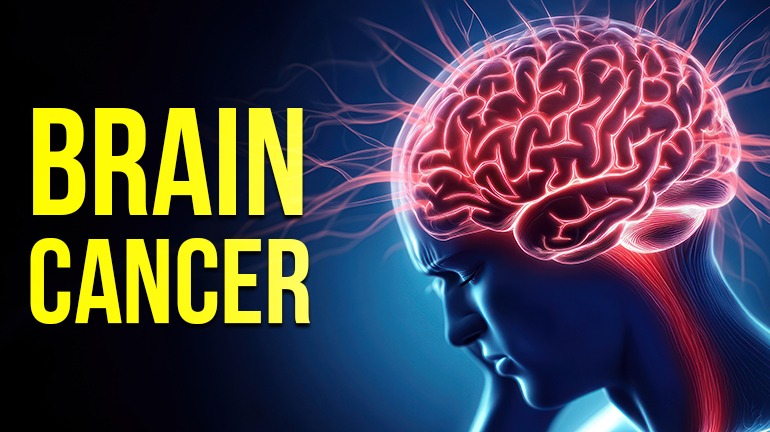
Brain Cancer
Brain cancer is a condition in which abnormal cells in the brain grow uncontrollably, forming tumors that disrupt normal brain functions.
- These tumors can be primary (originating in the brain) or secondary/metastatic (spread from cancers in other organs, such as lung, breast, or colon).
- Unlike benign brain tumors, malignant tumors can invade nearby brain tissues, compress vital structures, and spread within the central nervous system.
- Since the brain controls memory, speech, emotions, movement, and other vital functions, brain cancer can have severe neurological, physical, and cognitive effects depending on its location.
Causes of Brain Cancer
The exact cause of brain cancer is not fully understood, but several genetic, environmental, and lifestyle factors contribute:
Genetic Factors
- DNA mutations in brain cells leading to uncontrolled division.
- Inherited syndromes such as Li-Fraumeni syndrome, Turcot syndrome, Von Hippel–Lindau disease.
- Exposure to radiation (high-dose therapeutic radiation or environmental).
- Long-term exposure to carcinogenic chemicals (formaldehyde, vinyl chloride, pesticides).
- Smoking, alcohol, and poor lifestyle leading to oxidative stress.
- Weakened immune system (HIV/AIDS, post-transplant immunosuppressants).
- Family history of brain tumors.
- Hormonal imbalances and chronic inflammation.
- Agnimandya (weakened digestive fire) → Ama accumulation → spreads through Siras (channels) to Majja dhatu (nervous tissue).
- Vata–Kapha aggravation leads to Granthi and Arbuda formation in Shiras (head region).
- Viruddhahara (incompatible diet), Guru-Ahāra (heavy, oily foods), Ati-Madyapana (alcohol), Vega-Dharana (suppression of urges), and stress accelerate imbalance.
Environmental & Lifestyle Factors
Medical Factors
Ayurvedic View (Nidanas)
Types of Brain Cancer
Brain cancers are classified based on their cell type and location:
Primary Brain Tumors (originating in brain cells)
- Astrocytomas
- Oligodendrogliomas
- Glioblastoma multiforme (GBM – highly aggressive)
- Arise from meninges (protective membranes).
- Often slow-growing but can be malignant.
- Affect hormone secretion and endocrine function.
- Common in children; arise in the cerebellum.
- Develop from ependymal cells lining ventricles.
- Spread from cancers in lung, breast, kidney, colon, skin (melanoma).
- More common than primary tumors in adults.
- Age: Brain cancer can occur at any age, but certain types are more common in children (medulloblastoma) and others in older adults (glioblastoma).
- Family History & Genetics: Inherited syndromes (Li-Fraumeni, Turcot, Von Hippel–Lindau) and a positive family history increase risk.
- Radiation Exposure: High-dose therapeutic radiation or accidental exposure can trigger brain tumors.
- Chemical Exposure: Long-term exposure to carcinogens such as formaldehyde, vinyl chloride, pesticides, or petroleum products.
- Immune Suppression: HIV/AIDS, post-transplant immunosuppressive drugs increase susceptibility.
- Lifestyle Factors: Smoking, alcohol, processed foods, and poor sleep leading to oxidative stress.
- Previous Cancers: Patients with cancers like lung, breast, kidney, and melanoma are at higher risk of metastatic brain cancer.
- Headaches: Persistent, often worse in the morning or with activity.
- Seizures: New-onset seizures in adults can be a warning sign.
- Nausea & Vomiting: Due to raised intracranial pressure.
- Vision Problems: Blurred vision, double vision, or loss of peripheral vision.
- Speech & Hearing Difficulties: Trouble speaking, understanding, or hearing.
- Cognitive & Behavioral Changes: Memory loss, confusion, personality changes.
- Weakness or Numbness: Especially on one side of the body.
- Balance & Coordination Issues: Particularly with cerebellar tumors.
- Hormonal Imbalance: Pituitary tumors may alter hormone production.
- Raised Intracranial Pressure (ICP): Leading to headaches, nausea, and neurological deficits.
- Brain Herniation: Life-threatening compression of brain structures.
- Seizures: Can be recurrent and disabling.
- Hydrocephalus: Tumor obstructing CSF (cerebrospinal fluid) flow, causing fluid buildup.
- Neurological Impairment: Permanent loss of speech, movement, vision, or cognitive function depending on tumor site.
- Metastasis: Spread to other brain regions or spinal cord.
- Treatment-related Complications: Radiotherapy and chemotherapy may cause cognitive decline, fatigue, and immune suppression.
- Nidana: Wrong foods (Viruddhahara), weak digestion (Agnimandya → Ama), stress, suppressed urges, poor sleep, and lifestyle factors.
- Samprapti: Ama + Vata–Kapha aggravation obstruct Majja vaha srotas → Granthi formation → Arbuda in Shiras.
- Doshas: Vata (nerve dysfunction), Pitta (inflammation), Kapha (tumor growth).
- Lakshana: Headaches, dizziness, confusion, vision/hearing issues, memory loss, seizures.
- Management: detox, herbal medicines, Rasayana therapy, and Medhya Rasayanas (Brahmi, Shankhpushpi, Ashwagandha) to rejuvenate brain tissue, boost Ojas, and improve mental clarity.
- Essential for DNA repair and immune regulation.
- Enhances T-cell activity, helping the body recognize and destroy cancer cells.
- Protects neurons and supports Majja dhatu health.
- Reduces chemotherapy-induced side effects like loss of appetite and immune suppression.
- Works as a potent antioxidant, protecting brain cells from free radical damage.
- Supports hemoglobin production, preventing anemia and fatigue in cancer patients.
- Regulates angiogenesis (blood vessel growth), controlling tumor spread.
- Strengthens nerve conduction and improves energy metabolism.
- Brahmi (Bacopa monnieri): Improves memory, reduces stress, neuroprotective.
- Ashwagandha (Withania somnifera): Adaptogen, reduces oxidative stress, supports immunity.
- Guduchi (Tinospora cordifolia): Immunomodulator, protects against infections.
- Haridra (Curcumin extract): Anti-inflammatory, anticancer, reduces tumor progression.
- Shankhpushpi & Mandukaparni: Medhya Rasayanas that enhance concentration, memory, and brain function.
1.Gliomas (most common primary brain cancer)
2.Meningiomas
3.Pituitary Tumors
4.Medulloblastomas
5.Ependymomas
Risk Factors of Brain Cancer
Several factors increase the risk of brain cancer, though having them does not guarantee its development:
Signs & Symptoms
Symptoms vary depending on tumor size, type, and location in the brain, but common features include:
Complications of Brain Cancer
Brain cancer can cause severe and life-threatening complications due to its effect on vital brain structures:
Ayurveda’s Perspective on Brain Cancer
In Ayurveda, brain cancer is correlated with Arbuda (malignant tumors) and Shirogata Vikara (head disorders), caused by dosha imbalance, ama accumulation, and Majja dhatu dushti.
Brain Cancer Treatment at Nageswara Ayurvedic – Role of Plant-based Zinc & Copper
At Nageswara Ayurvedic, brain cancer treatment focuses on a holistic approach – detoxification, dosha balancing, Majja dhatu protection, and Rasayana (rejuvenation). A central role is given to plant-based Zinc and Copper, which act as Rasayana minerals supporting brain tissue health, immunity, and cell regulation.
Zinc (Plant-based):
Copper (Plant-based):
Synergistic Role with Ayurvedic Herbs
When combined with powerful Ayurvedic Rasayana herbs, Zinc and Copper show enhanced effects:
Treatment Relevance at Nageswara Ayurvedic
At Nageswara Ayurvedic, brain cancer care is designed as a comprehensive and integrative program combining detoxification, dosha balance, Rasayana therapy, and supportive care. The goal is to improve survival outcomes, protect neurological functions, and enhance the quality of life for patients.
1.Shamana (Pacification & Symptom Management)
Shamana therapy focuses on managing symptoms and balancing aggravated doshas. Herbal formulations with anti-inflammatory, antioxidant, and neuroprotective activity are administered. These include Guduchi, Haridra (Curcumin), Brahmi, Ashwagandha, Shankhpushpi, and Guggulu-based medicines. Together, they help reduce seizures, headaches, mental stress, oxidative stress, and inflammation, while supporting nervous system resilience.
Rasayana therapy plays a central role in brain cancer management. Special formulations enriched with plant-based Zinc and Copper are used for their neurological and immune-enhancing benefits:
Zinc (Guava Leaves Extract 4.0%) – Supports DNA repair, regulates apoptosis of cancer cells, strengthens immunity, and protects nervous tissue.
Copper (Sesame Seed Extract 0.5%) – Enhances nerve conduction, improves brain metabolism, and provides antioxidant defense to neural tissues.
Together, Zinc and Copper help reduce inflammation, nourish Majja Dhatu (nervous tissue), and protect against treatment-induced neurotoxicity.
3. Diet & Lifestyle Correction
Patients are advised to follow a Laghu Ahara (light, easily digestible diet) to reduce Ama (toxins) and keep metabolism balanced. Recommended foods include green leafy vegetables, fruits, turmeric, and millets.
4.Supportive Integration with Modern Care
The Ayurvedic protocol at Nageswara Ayurvedic is designed to complement conventional brain cancer treatments such as surgery, radiotherapy, and chemotherapy. Herbs Bhasma’s helps in reducing the side effects including nausea, fatigue, appetite loss, and cognitive decline. By improving neurological protection and overall immunity, the treatment protocol enhances recovery, reduces recurrence risk, and significantly improves the patient’s survival quality.
